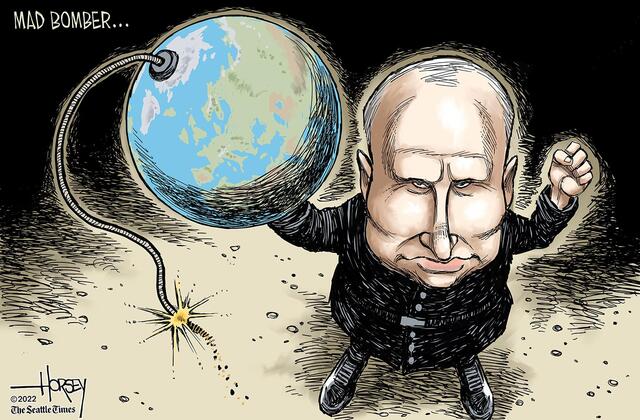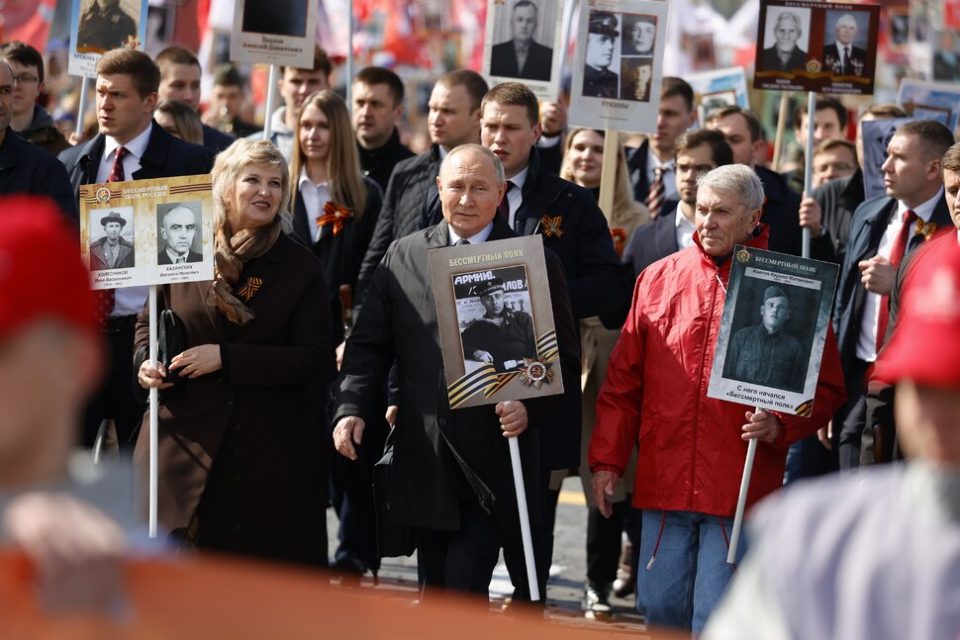Russian President Vladimir Putin’s decision not to declare war on Ukraine at the high-profile Victory Day celebrations he oversaw in Moscow this week was made amid concerns that the security of his regime rests at least in part on how he handles the war in Ukraine and amid growing fears that missteps could unravel his domestic power, a new analysis suggests.
Though he was verbose on Russia’s military power and comparisons between the current regime in Kyiv and Nazi Germany – whose defeat serves as the central focus of annual celebrations on May 9 – Putin fell short of unleashing the full might of Russia’s military on the former Soviet state, as many Western officials and analysts believed he would. In doing so, he also declined to ask anything more of the Russian people at a time central tenets of his war campaign have stalled while others have begun to unravel.
“Putin implicitly reassured the Russian population that he would not ask them for a greater commitment to the war effort,” the Institute for the Study of War concluded in a note released late Monday. “Putin likely calculates that he cannot ask the Russian people to mobilize without triggering a destabilizing backlash against his regime.”
Political Cartoons on World Leaders

The institute notes some indications that the current state of the war in Ukraine has affected how the Russian population views the preemptive invasion Putin ordered in February. Early indications suggested near unanimous support and shared sense that the government of Ukrainian President Volodymyr Zelenskyy posed some sort of direct threat to Moscow.
Though 80% still support the war, only 50% strongly support it, with nearly a third feeling “anxiety, fear and horror” related to the invasion, according to polling in mid-April from the Levada Center, a Russia-based independent social research firm.
“Western sanctions will likely increasingly impact Russian citizens in the coming months, limiting the enthusiasm of the general population to make greater sacrifices for the war effort,” according to the analysis. “Putin likely also faces internal discontent from Russian elites and security forces, and the war has degraded the military that would defend his regime from large-scale domestic unrest.
“Putin likely factored these calculations into his decision to pursue a steady-state approach to the war, rather than an escalatory mobilization.”
The Russian leader may not have sought to expand his country’s involvement in the war without clear cause, he also indicated Monday that he had no intention of backing away from the fight. Following the parade, Putin met with the father of a Russian commander known for particular brutality against Ukrainian military captives who died fighting in the Donbas, the embattled easternmost region of Ukraine, and pledged that he would continue his war.
Ukraine did not leave Russia any other opportunity but to fight, Putin claimed, furthering his groundless assertion that Kyiv provoked the Kremlin into conflict. Russia’s soldiers are fighting “courageously, heroically, professionally,” he added, according to a translation of his remarks, before stressing, “All the plans are being fulfilled. A result will be achieved. There are no doubts about this.”
Western officials, however, counter with other battlefield assessments that show Russia’s forces have created problems for themselves by continually extending their lines beyond what their logisticians can handle, all under the command of unprepared general officers. Ukraine’s armed forces have also proven more effective on the battlefield than most appeared to expect, both in the Kremlin and in Western capitals, due in part to the steady flows of weapons from partner countries.
British military intelligence reported this week that at least one of Russia’s most advanced battle tanks, the T-90M, had been destroyed despite its upgraded armor and ability to defend against anti-tank weapons. It also noted that Russian generals and other senior officers continue to be compelled to move to the front lines due to “difficulties in command and control, as well as faltering Russian performance.” At least a dozen Russian generals have died in 75 days of fighting.
“The Russians just have not been able to make any significant progress at all,” Pentagon spokesman John Kirby told reporters on Monday when asked about the fighting in eastern Ukraine, a region known as the Donbas. He particularly noted Ukrainian troops’ ability to counter Russian artillery with strikes of their own.
“It’s helped by the weather. It’s very muddy there so they are pretty much restricted to paved roads,” he said, adding, “They haven’t fixed all their logistics and sustainment issues, we still see them struggling to resupply their troops.”


